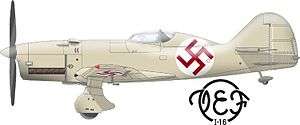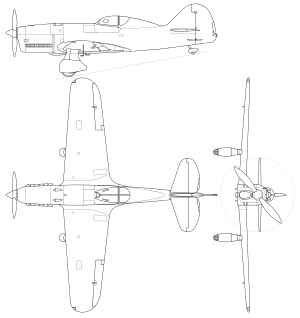VEF I-16
| VEF I-16 | |
|---|---|
 | |
| Role | fighter |
| Manufacturer | VEF |
| Designer | Kārlis Irbītis |
| First flight | 1940 |
| Retired | 1942 |
| Number built | 1 (in some sources 3) |
| Unit cost |
130,568 Lats (about $27,000 US) |
The VEF I-16 was a prototype Latvian fighter aircraft designed by Kārlis Irbītis and produced by VEF in 1939. Development was halted by the Soviet occupation of Latvia in 1940 and subsequent purges of VEF personnel.
Description
The I-16 was of conventional monoplane layout with a Walter Sagitta supercharged air-cooled V12 engine of Czechoslovak origin, a two-bladed propeller and a low set wing with rounded wingtips. The prototype had fixed undercarriage with aerodynamic fairings, but production models were to have retractable landing gear. The cockpit seat and controls were designed as one unit - they could be assembled totally separately from the rest of the aircraft and then installed as a unit with only six bolts. While the prototype was unarmed, there were provisions for two machine guns in the fuselage, along with the ability to carry one additional gun under each wing.
Operational history
In the spring of 1940 Latvian Air Force pilots made the first test flights of the VEF I-16 prototype. After the occupation of Latvia in June 1940, the Soviet authorities ordered that all VEF aircraft be removed from Spilve Airport and, a few weeks later, all parts fabrication and assembly work was ordered suspended pending further instructions from Moscow. In March 1941, the I-16's designer Kārlis Irbītis received orders to prepare one example each of the VEF I-12, VEF I-15a and I-15b, I-16, VEF I-17 (two variants) and VEF I-18 to be shipped to Moscow for evaluation. The I-16 still had engine problems and needed further testing, so was left behind and stayed in Riga. Following the German invasion of the Soviet Union, the I-16 managed to make several test flights from an aerodrome in Kalnciems but soon the single example was captured by German forces and tested by the Luftwaffe. The VEF I-16 was used as training aircraft at an aviation school in Torun until 1942.
Specifications (I-16)

Data from Latvia's Little Hawk [1]
General characteristics
- Crew: One
- Length: 7.30 m (23 ft 11 in)
- Wingspan: 8.23 m (27 ft 0 in)
- Height: 2.70 m[2] (8 ft 10 in)
- Wing area: 11.43 m² (123.0 ft²)
- Empty weight: 1,100 kg (2,420 lb)
- Loaded weight: 1,540 kg (3,388 lb)
- Powerplant: 1 × Walter Sagitta I-SR air-cooled, inverted V12 engine, 403 kW (540 hp)
Performance
- Maximum speed: 483 km/h (261 knots, 300 mph) at 7,900 m (25,900 ft)
- Range: 805 km (438 nmi, 500 miles)
- Service ceiling: 8,100 m (26,600 ft)
- Wing loading: 136 kg/m² (28 lb/ft²)
- Power/mass: 220 W/kg (0.13 hp/lb)
Armament
- Guns: 2x 7.9 mm Browning machine guns
References
- Davis, Chuck. "Latvia's Little Hawk". Air Enthusiast, Forty-eight, December 1992 to February 1993. ISSN 0143-5450. pp. 58–64.
External links
| Wikimedia Commons has media related to VEF I-16. |